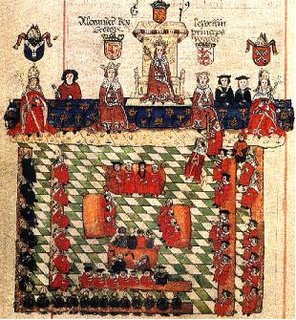Back to English medieval history for today's post.
The Good Parliament was the name given to the reforming English Parliament that sat between 28th April and 10th July 1376, in the reign of Edward III.
In those days the monarchy, regarded with general suspicion by the people, tended to avoid calling a Parliament unless money needed to be raised, as was the case in 1376 due to the expense of the war with France.
Sure enough the Parliament flexed its muscles against Edward (and his 4th son and key fixer John of Gaunt), and made a number of moves.
Firstly it appointed the first Speaker, Thomas Hungerford; secondly it introduced impeachment for officials thought to be abusing their power (ie siphoning off Treasury funds). Thirdly it upheld the principle that no taxation should be raised without Parliamentary consent (please note Gordon). Oh, and it also placed the King's aquisitive mistress Alice Perrers "in seclusion".
Although John of Gaunt saw to it that the following parliament undid much of the good work (implementing the dreaded Poll Tax - see previous post on the Peasant's Revolt) , the principles upheld in the "Good Parliament" ultimately won through.
11 July, 2006
The Good Parliament (28th April to 10th July, 1376)
Posted by
cardinal_wolsey
at
10:49 PM
![]()
Labels: 14th Century History, Edward III, John of Gaunt, Medieval History, Parliament
Subscribe to:
Post Comments (Atom)

No comments:
Post a Comment